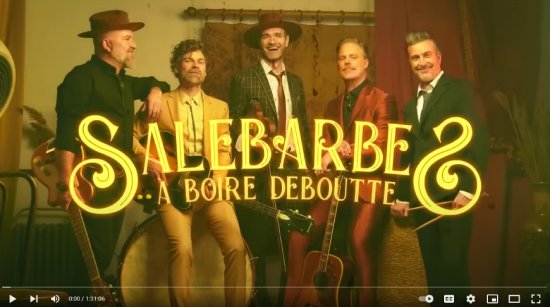À boire deboutte is a collection of 11 songs written and recorded over a period of six weeks, at Studio B-12 in Valcourt, a town in Québec’s Eastern Townships. “Six weeks!” exclaims Éloi Painchaud, the ex-Okoumé member, multi-instrumentalist, and producer. “In and of itself, it’s any musician’s dream to have that much time to try all kinds of things and find the right word to say it.”

This follow-up to the band’s two previous albums, Live au Pas Perdus and Gin à l’eau salée, reconfirms the five Acadians’ passion for smiley, happy folk songs so often found in that corner of the continent.
“After five years as a band, we felt like sharpening our pencils, and having fun with words as much as with sounds,” says Painchaud. “The songs on Gin à l’eau salée that had the biggest impact on the audience were the ones we wrote ourselves. “Good Lord” was incredibly well received, so we just told ourselves, ‘Let’s dive in.’
“It’s fertile ground for me,” Painchaud continues. “I’ve spent the last 25 years as a producer, being a mirror for the artists I work with, and trying to illuminate their musical colours. I’ve become more measured, and I like giving others more space.”
Is he surprised by Salebarbes’ success? “No doubt,” he says. “Our audience is as important as we are. They’re the ones who take our band’s festive energy and return it just as powerfully. We’re like a community. Our crowds are vocal, vibrant, and dancing. What completely charmed us were the videos of enthusiasts line-dancing to ‘Good Lord.’ They even came up with their own choreography!”
There are two ex-Okoumé guys in the band: brothers Éloi and Jonathan, who were quite successful in the ’90s. “Jo and I have always had this writing discipline since our teens,” says Éloi. “We like to sit down in front of a piece of paper. We like the game of writing songs. I know how Jo thinks and vice versa. Just like hockey, we always come together on the rink. Everyone in the band contributes, and has an equal chance to score points,” he goes on.
“Salebarbes’ writing is like a mosaic,” says Painchaud. “We tip our hats to our friends in Louisiana and Acadie, and there’s a lot of humour in our songs, as well as a lot of friendship in this band. The glue that binds us together is the unbelievable amount of fun we have.”
Salebarbes’ website offers lyrics to the songs on all three albums, an added value that helps visitors understand the Acadian expressions and accents used, and the folklore associated with them. Take, for example, “Stirer la roux.” Éloi explains, “In any human relationship, if you let things stick to the bottom, it’ll get bitter. Take care of the people you love. In Louisiana, they say, ‘le roux.’ It’s the basis of many dishes, and it’s made with butter, flour, onions, and garlic. Stirer la roux means scraping the bottom of the pan.”
Band member Georges Belliveau is from Memramcook, as is his fellow Salebarber Menoncle Jason. “He’s got an accent as thick as a brick,” says Painchaud. “Jean-François has his Caraquet accent.”
“Up until I was fifteen, I had a very big Îles-de-la-Madeleine accent,” says Éloi, the son of Alcide Painchaud, who was a founding member and the leader of the Madelinois band Suroît – whose Bruce Daigrepont-written song “Disco fait dodo” is one that Salesbarbes often plays live.
Jean-François Breau, the one with the highest profile of the group, is perfectly happy as a member of Salebarbes. “He’s a pillar of the band,” Painchaud admits, “because he’s so enthusiastic, generous, and communicative in everything we do; he’s like a golden retriever who runs after all the balls that are thrown, with the same level of enthusiasm!”
The band just started touring the new album. “It’s a show you experience from both sides of the stage,” says Painchaud. “It’s a connection that’s almost a celebration. It’s jubilant; I don’t have a better word to describe it.”
At Montréal’s MTelus on Oct. 5, 2023
salebarbes.com
